TNP Holds Geshemas Strategic Visioning Workshop
From April 8-12, 2024, the Tibetan Nuns Project organized a Geshemas Strategic Visioning Workshop at Dolma Ling Nunnery and Institute in Dharamsala in conjunction with the Women’s Empowerment Desk of the Central Tibetan Administration.
The workshop was held with eight Geshemas from Dolma Ling and four Tibetan Buddhist nuns who are currently studying for their Geshema exams. The workshop aims to empower Geshemas in shaping the future of their role within Tibetan Buddhism.
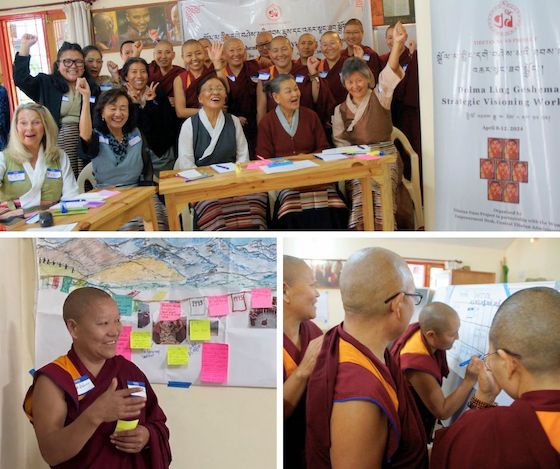
The 5-day workshop aimed to explore the future vision of the Geshemas (holders of the highest academic degree in Tibetan Buddhism) and support their participation in the larger social realm. The goal is to empower the Geshema to contribute back to the community through various leadership roles.
The Geshema degree is the highest level of training in the Gelugpa tradition and is equivalent to a PhD in Tibetan Buddhism. The Geshema degree is the same as a Geshe degree but is called a Geshema degree because it is awarded to women.
The degree was only formally opened to women in 2012. Sixty nuns currently hold the Geshema degree and many nuns will take various levels of the four-year Geshema exams this summer. The degree makes them eligible to assume various leadership roles in their monastic and lay communities reserved for degree holders and hence previously not open to women.
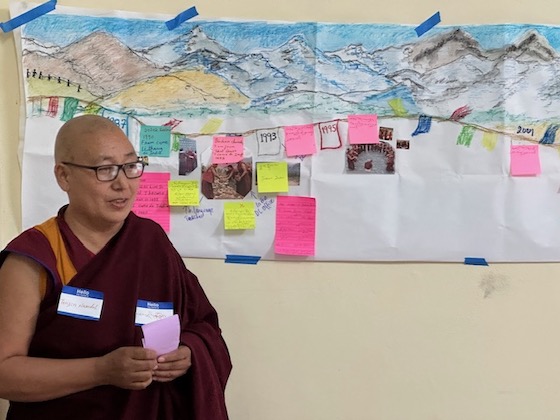
As part of the workshop, the nuns used a big graphic illustration of Dolma Ling’s timeline called HERstory (rather than history) to help set the stage for the subsequent days. Hearing about their journeys from Tibet to the present was fascinating and awe-inspiring for everyone.
As part of the workshop, the nuns shared their stories. Several nuns started learning the Tibetan alphabet in their 20s and many only after they came to Dolma Ling. Many nuns had no schooling in Tibet or they were sent to Chinese schools with no opportunity to learn Tibetan. Here are some photos from the first days of the workshop.
The Workshop Organizers
The five-day workshop was conducted and facilitated at Dolma Ling by TNP board member, Dechen Tsering, with the help of TNP board members Tseten Phanucharas and Robin Groth.
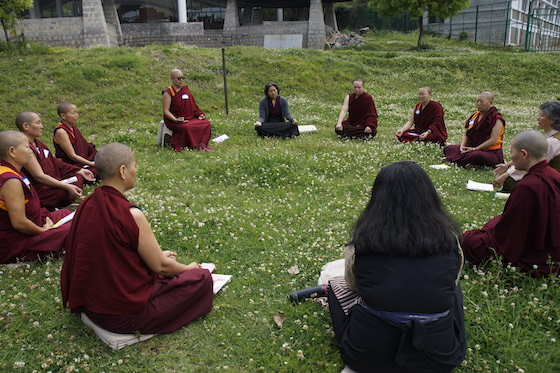
The Geshema degree stands as the pinnacle of educational attainment within the Gelugpa tradition. The workshop was aimed at enhancing leadership skills and awareness among Geshemas, empowering them to navigate life more effectively and cultivate their leadership qualities.
We are very grateful to our partner co-facilitators from CTA’s Women’s Empowerment Desk who helped prepare the workshop charts and banners and did the Tibetan-language translations. The team from the Women Empowerment Desk included Tsering Kyi (Lead Facilitator), Tenzin Tseten (co-facilitator), and Tenzin Dolkar (Tibetan language translator). They also offered a workshop on Gender and Leadership on April 10th.
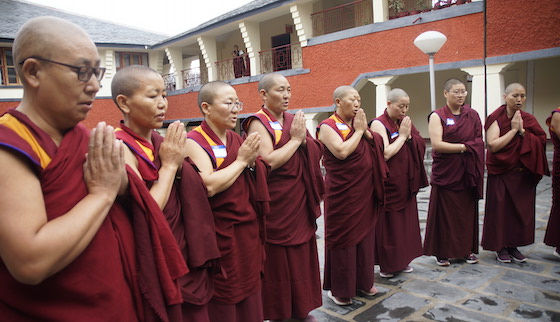
Geshemas at Dolma Ling offer prayers as part of the visioning workshop. The Geshema degree (called a Geshe degree for monks) was only formally opened to women in 2012. As of November 2023, 60 nuns hold this highest degree roughly equivalent to a doctorate in Tibetan Buddhist philosophy.
The Tibetan Nuns Project is also very grateful to our thought partners, Beckie Masaki and Nancy Wan from Bay Area’s Gathering Strength Coalition for working with Dechen Tsering in co-conceptualizing the workshop agenda and creating the HERstory timeline chart used to illustrate major milestones – past and future – by the workshop participants.
A Range of Workshop Activities
Over the five days, the participants took part in many group and individual activities including written vision statements about where they saw themselves in five years in 2029. Many of the nuns pictured themselves returning to their hometowns in Tibet or Spiti as principals of new schools they would start. Two nuns envisioned themselves as bilingual online Buddhist teachers. Four of the nuns already speak quite good English and want to improve so they can teach. One nun envisioned herself as director of TNP-paid staff at Dolma Ling. One nun saw herself in solitary retreat for five years to prepare for the next life.
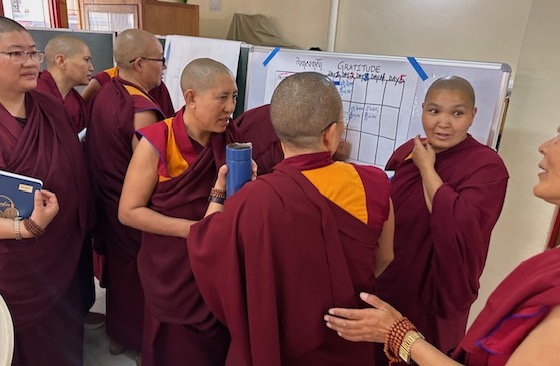
Throughout the five days, attendees engaged in discussions on a range of topics, including effective communication, problem-solving, active listening, gender and leadership, leadership qualities and styles, team-building exercises, and visualization exercises.
Dechen Tsering wrote, “The Geshemas (and four future Geshemas) who took part were extremely enthusiastic, energetic, engaged, and participated fully throughout the five days! Together, we shared, we learned, we meditated, we played, and we laughed all week. We had fun!”
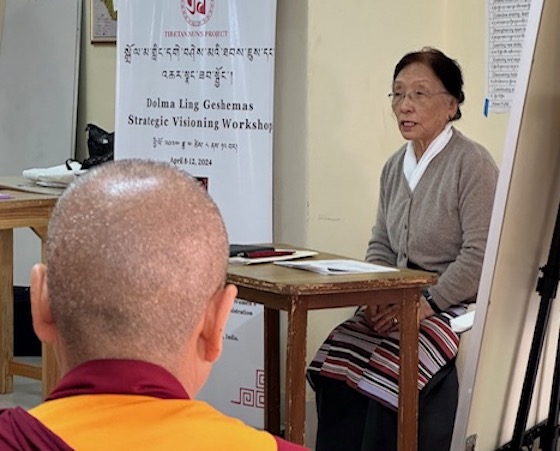
Rinchen Khando Choegyal, Founding Director and Special Advisor for the Tibetan Nuns Project gave an inspirational talk. She emphasised the evolution and significance of the Geshema degree, highlighting how the Geshema’s contributions to the Tibetan community and Buddhist philosophy play a pivotal role in shaping history.
Board member, Robin Groth, created this slideshow of the workshop.
Making Headlines
The workshop made the news. On April 10th, a media team from VOA Tibetan came to Dolma Ling and did a 20-minute feature video story and interview in Tibetan with lead organizer, Dechen Tsering. Within two days the story had been viewed by over 2,600 people.
On April 13th, the Voice of Tibet did this interview and feature story entitled “Conversation on building a strategic vision and challenges for Geshemas.” The video is in Tibetan and shows many of the activities in the workshop. Can’t see the video? Click here.

Dear Geshema‘s, congratulations. It is very important to have very good education for women, for nuns.
One more topic I would like to bring to your attention: Full Ordination for women. It not only needs Geshe degree, it also needs full ordination to become an Abess.
Now, in Bhutan, for the second time women have received full ordination in the Mulasatvastivadin lineage. The other possibility is to go to Vietnamese or Chinese masters and use the Dharmagupta lineage.
Please, consider this possibility.
Sincerely yours,
Gelongma Tenzin Metok